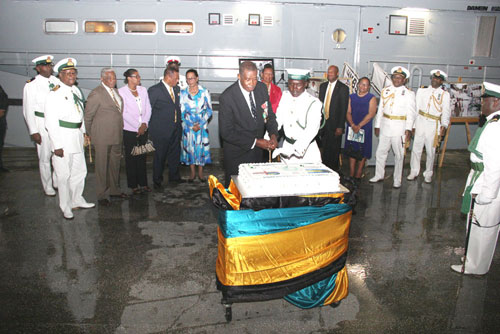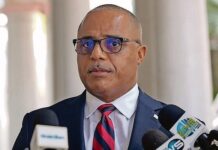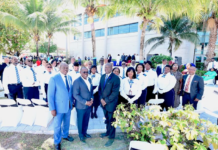
Nassau, The Bahamas – Retired Defence Force Commander, Commodore Leon L. Smith’s steady, no-nonsense approach to leadership during the development years of the Royal Bahamas Defence Force throughout the “very challenging” 1980’s, must never be understated in the annals of Bahamian history, Prime Minister the Rt. Hon. Perry Gladstone Christie said, at the commissioning ceremony of HMBS Leon Livingstone Smith, September 19, at Kelly’s Dock, Prince George Wharf.
Mr. Christie said it was under Commodore Smith’s guidance that the Force grew and flourished into a vibrant, multi-mission military entity, consisting of a cadre of fine naval officers and enlisted personnel, with the capacity to perform at the best possible levels both on land and at sea.
“Quite frankly, except for Cuba and the Dominican Republic, whose navies are possessed of restricted offensive competencies, the Royal Bahamas Defence Force is unrivalled in this region (as a result of Commodore Smith’s leadership),” Mr. Christie said.
“Moreover, it is my view that the Force’s high approval, which persisted following the May 10th 1980 HMBS Flamingo tragedy, can be significantly attributed to the stable and sure-footed leadership of Commodore Smith over the years.”
Commodore Smith, who served 14 years as the first Bahamian Commander, Defence Force, has been credited with implementing a number of “firsts” during his tenure including the establishment of the Force’s Air Wing Section; the establishment of the Defence Force’s Ranger Cadet Programme at the Donald W. Davis Secondary School; the “Bahamianization” of the Defence Force; the construction of a Sick Bay at HMBS Coral Harbour Base which has since been upgraded to a Medical Facility and the implementation of the Harbour Patrol Unit, among others.
Mr. Christie said Commodore Smith was able to garner the confidence and respect of his counterparts in the United States Coast Guard, and elsewhere, which resulted in the grant of six (6) decommissioned 95-foot Cape Class Cutters, to the Defence Force in 1989.
“These served to shore up the Force’s, by then, over-worked and rapidly aging fleet which at the time consisted of a few three medium range patrol boats supported by several converted confiscated crafts,” Prime Minister Christie said.
“Additionally, the determined response of Defence Force personnel in addressing the devastation experienced by the people of Eleuthera in the aftermath of Hurricane Andrew in 1992, further served — not only to build the confidence of the Force — but to also further solidify the importance of the organization to the country.”
Mr. Christie said by 1993, Commodore Smith had essentially presided over the complete Bahamianization of the Force.
“In the process, he also demanded the respect of his Caribbean counterparts, who for all intents and purposes were leading armies as opposed to his naval-based organization, by insisting at all levels that his personnel were cross-trained in both naval and infantry operations and could compete at the highest levels with the world’s best.”
This confidence would be tested in 1994 when he was called upon to deploy Bahamian troops in support of the Caribbean Community’s (CARICOM) decision to send troops into the neighbouring Republic of Haiti in an effort to restore democracy.
As a result of this action, Bahamian officers and marines were deployed overseas for the first time in the history of an independent Bahamas to participate along with multi-national forces, and eventually become part of the United Nation’s Peacekeeping Mission that was sent there to ensure that free and democratic elections were held in Haiti.
Mr. Christie said Commodore Smith’s confidence in the capabilities of his troops was completely validated over the ensuing three years of deployment as Bahamian officers and marines received more medals and commendations than any of their CARICOM counterparts over the duration of the mission.
Realizing the need for discipline among Bahamian youth, Commodore Smith, in 1995, instituted the first chapter of Royal Bahamas Defence Force Rangers’ Cadet Program, at Donald Davis Secondary School in New Providence.
“Looking at the results that have been achieved, it is my considered view that this initiative might very well be the bedrock upon which a national youth programme can be developed as it has served to bring a sense of focus and purpose to the lives of many over the years,” Mr. Christie said.
“To date, guided by its motto: ‘Discipline, Dedication and Determination’, some 5,500 students have participated in the programme. At present, there are 800 active members in some 39 schools throughout New Providence, Grand Bahama and Abaco.
“I am also heartened to learn that the Rangers’ Program is also considered a feeder system for participants who wish to on to the Royal Bahamas Defence Force upon graduation from high school,” Mr. Christie added.
Mr. Christie said Commodore Smith, having benefited from the valuable clerical and other shore-based support provided by WR(e)NS (Women Royal Naval Services) in the Royal Navy, whilst at Staff College in 1979, and with the guidance of the then Secretary to the Cabinet, Mrs. Margaret McDonald, crafted a proposal aimed at convincing Prime Minister, the Rt. Hon. Lynden Oscar Pindling of the need to recruit women into the service who would, as marines, be subject to Force discipline and regulations.
The first woman’s entry comprising 16 marine recruits was enlisted in the Force in 1985. Mrs. Ena Mae Rolle, an Executive Officer in the Ministry of Defence, served as their divisional officer, and Sergeant Ella Mae Rolle of the Royal Bahamas Police Force, was assigned to serve as chaperone throughout their training period.
Cheryl Bethel and Gaye Major were selected to attend the nine-month Officers’ Training Course at Britannia Royal Naval College in 1987, and in so doing, became the first female officers in the Force.
At present, 211 women serve in the organization — two of the 13 officers as Head of Departments, and the others as integral members of every major department contributing equally alongside their male contemporaries.
“Commodore Leon Smith, over the course of his 40-year plus career of service to this country, 14 of which were spent at the helm of the Defence Force, did much good with little to no regard for accolades or fanfare. And as Prime Minister of the Commonwealth of The Bahamas it gives me tremendous satisfaction to salute you, Sir, along with your wife Helen, and your children, for your many years of service to this country of ours,” Mr. Christie added.








